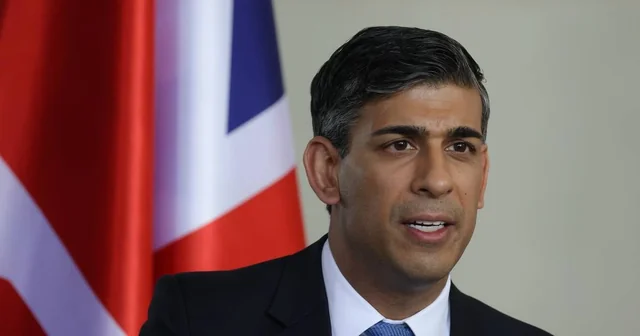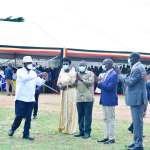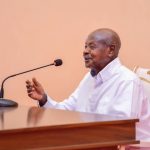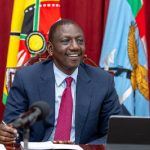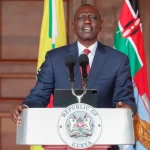Prime Minister Rishi Sunak suggested that reports indicating the UK government’s Rwanda asylum plan is causing an increase in migrants arriving in Ireland serve as evidence of its effectiveness in deterring illegal crossings into Britain.
Sunak argued that the uptick in Ireland-bound migration shows that the Rwanda plan is steering asylum seekers away from UK shores, which, in turn, underscores the policy’s intended impact. However, this stance has fueled debate as critics question whether such a shift in migration patterns truly reflects success or highlights the need for a more comprehensive approach to handling refugee flows and international responsibilities.
“The deterrent is … already having an impact because people are worried about coming here,” the Prime Minister said.

The Irish government is to consider legislative proposals next week on returning asylum seekers who have travelled from the UK.
It comes after deputy Irish premier Micheal Martin said the UK’s asylum policy is driving migrants in fear of being deported to Rwanda across the border from Northern Ireland into the Republic.

Mr Sunak said others now recognised a “meaningful deterrent” is key to curbing illegal migration and celebrated that “now even top parties in the EU are following our lead”, after EU conservatives backed a policy of forcing people claiming asylum in the EU to settle outside the union.
UK ministers plan to send asylum seekers coming to the UK on a one-way flight to the east African nation, with the aim of deterring others from crossing the English Channel on small boats.
The legislation ensuring the plan is legally sound, the Safety of Rwanda (Asylum and Immigration) Act, cleared its passage through Parliament this week and was signed into law on Thursday.
In an interview with Sky News’ Sunday Morning with Trevor Phillips, which will air in full on Sunday, the Prime Minister was challenged over whether the UK is simply exporting the problem.
Mr Sunak said: “My focus is on the United Kingdom and securing our borders.
“But what that comment illustrates is a couple of things.
“One, that illegal migration is a global challenge, which is why you’re seeing multiple countries talk about doing third country partnerships, looking at novel ways to solve this problem, and I believe will follow where the UK has led.
“But what it also shows, I think, is that the deterrent is, according to your comment, already having an impact because people are worried about coming here and that demonstrates exactly what I’m saying.
“If people come to our country illegally, but know that they won’t be able to stay, they’re much less likely to come, and that’s why the Rwanda scheme is so important.”
Downing Street on Friday rebuffed claims the Rwanda plan was already influencing movements into Ireland, saying it was too early to jump to conclusions on its impact.
Mr Martin, who also serves as Ireland’s foreign affairs minister, told reporters in Dublin on Friday: “Clearly, we’ve had an increase in the numbers coming into Northern Ireland into the Republic. And it’s fairly obvious that a Rwanda policy, if you’re a person in a given situation in the UK and well, then you don’t want to go to Rwanda – not that anybody has gone yet, I hasten to add.
“So I think it’s a fair comment of mine. There are many other issues – it’s not in any way trying to blame anything or anything like that.”
But a No 10 spokeswoman told journalists in Westminster: “It is too early to jump to specific conclusions about the impact of the Act and treaty in terms of migrant behaviour.
“Of course, we will monitor this very closely and we already work very closely as you would expect with the Irish government, including on matters relating to asylum.”
In the Mail on Sunday, the Prime Minister wrote: “I said when I first became Prime Minister that others would recognise a meaningful deterrent is the only way to stop the boats and now even top parties in the EU are following our lead.”
It comes after European Commission president Ursula von der Leyen’s centre-right European People’s Party manifesto for June’s EU elections proposed a UK-style asylum plan under which “anyone applying for asylum in the EU could also be transferred to a safe third country and undergo the asylum process there”.
Mr Sunak this week acknowledged it could still take 10 to 12 weeks to get flights to Rwanda in the air, in a blow to his earlier target of seeing this take place in the spring of this year.
A spokesman for Irish premier Simon Harris said he is “very clear about the importance of protecting the integrity” of Ireland’s migration system.
“Ireland has a rules-based system that must always be applied firmly and fairly.
“In that context, the Taoiseach has asked the Minister for Justice to bring proposals to Cabinet next week to amend existing law regarding the designation of safe ‘third countries’ and allowing the return of inadmissible international protection applicants to the UK.
“This is one of a number of measures we are taking to strengthen our system and ensure that it is strong, effective and agile. Rules and the integrity of our migration system will be to the fore of our actions.”
Irish ministers earlier this week suggested there had been a rise in the number of migrants crossing the land border between Northern Ireland and the Republic.
Justice minister Helen McEntee told a committee of the Irish Parliament the number was now “higher than 80%” crossing from Northern Ireland.
She said that she would be legislating to respond to a High Court decision on returning people to the UK and would meet Home Secretary James Cleverly next week.
“What is clear in the decision that the UK have taken in choosing Brexit, they have actually seen an increase in people seeking asylum in their country. The way that they deal with that, it’s their policy,” she told RTE on Saturday.
“My focus as Minister for Justice is making sure that we have an effective immigration structure and system.
“That’s why I’m introducing fast processing. That’s why I’ll have emergency legislation at Cabinet this week to make sure that we can effectively return people to the UK.”
SOURCE: NEWS AGENCIES

